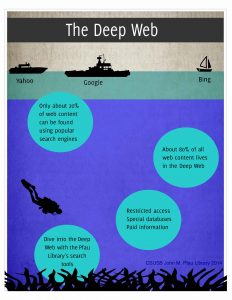Students explore the economic and social implications of free and fee-based information access in order to critically analyze the information environment.
Discussion Prompts
- What if you don’t go to college or work at a job that gives you access to content in the Deep Web? For example, how would you get scholarly information about a medical diagnosis?
- Are there types of resources you might be able to find on the open web for your classes? If so, what are they? Why are they useful?
- What are the pros and cons of charging for information in the Deep Web?
- Check out the “Engagement Questions” posed in “Why Does Google Scholar Sometimes Ask for Money?” Engaging Science Students in Scholarly Communication and the Economics of Information.
Class Activities
- Starting your research on the open web is a great idea – often, blogs, news articles, and even Wikipedia entries can provide an entry into a topic. Access a Wikipedia article on a topic of interest. Read it to get background information, then look at the references below the entry. Can you access all of the references? Are there any scholarly sources you cannot access for free online? If so, try using OneSearch or check out our Databases by Subject to find them through the library. If you were to create or contribute to a Wikipedia article, would you include resources in the Deep Web in your reference list? Why or why not?
- Read the article Yes, We Were Warned About Ebola and consider the role that information access played in this public health disaster. Reflecting on money, power, exploitation, etc., students create an annotated map of the “information journey” addressed in the text:
- Part of the problem is that none of these articles were co-written by a Liberian scientist. The investigators collected their samples, returned home and published the startling results in European medical journals. Few Liberians were then trained in laboratory of epidemiological methods. Even today, downloading one of the papers would cost a physician [in Liberia] $45, about half a week’s salary… As it happened, the subjects in the 1986 antibody studies worked on the world’s largest rubber plantation (which then supplied 40 percent of the latex used in the United States)… The way this part of Liberia was trawled for vital medical knowledge thus mirrored the way the West extracted the rubber it needed.
- Watch this video on Information Economics, and then watch our Open Access video. In your own words, explain the difference between traditional academic publishing and open access models. List the pros and cons of both models.
- Split students into three groups to explore how Internet access alone doesn’t necessarily democratize information. Each group reads The Lopsided Geography of Wikipedia, and students are prompted to think about what influences participation and representation on Wikipedia. One group focuses on the role of technology, the second on the role of language, and the third on the role of government. Groups then share out to whole class.

Did You Know?
- U.S Government documents can be accessed through the open web because federal agencies are required to keep the public informed. Official publications can be found at domains ending in .gov and .mil.
- If you use Google, try what is called a site:query. For example, a search for anorexia site:.gov will retrieve content about anorexia from government websites.
- Because the library is not a for-profit institution, we choose to provide Interlibrary Loan services to our users. We recognize that not every library can afford to buy every information source ever created, so the Interlibrary Loan program allows us to share content such as books and articles with other libraries. This also ensures that we can be smart about what we purchase – we know that if we choose not to buy something, we can usually get it for you through Interlibrary Loan.
Pfau Library Videos
Related Resources
LibGuide: Articles: Find Articles on Your Topic
Deep Web Infographic
Last updated 2018
